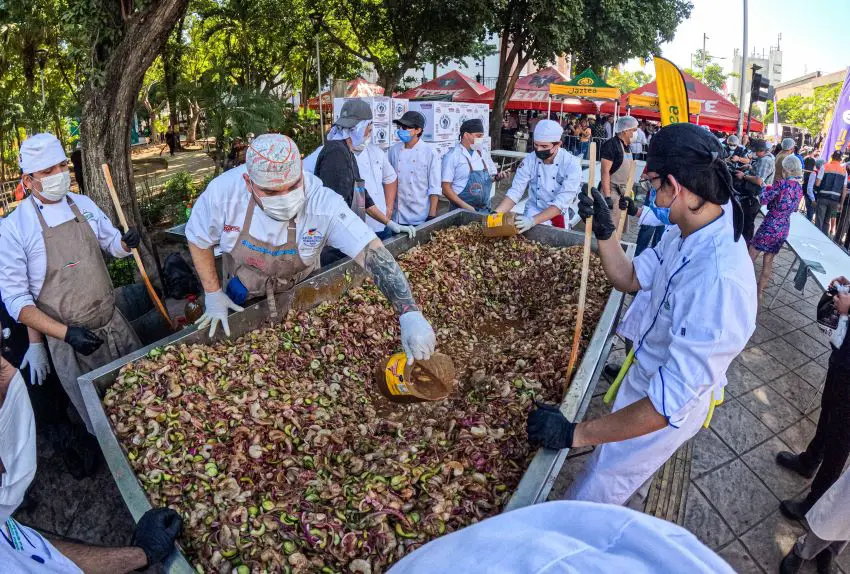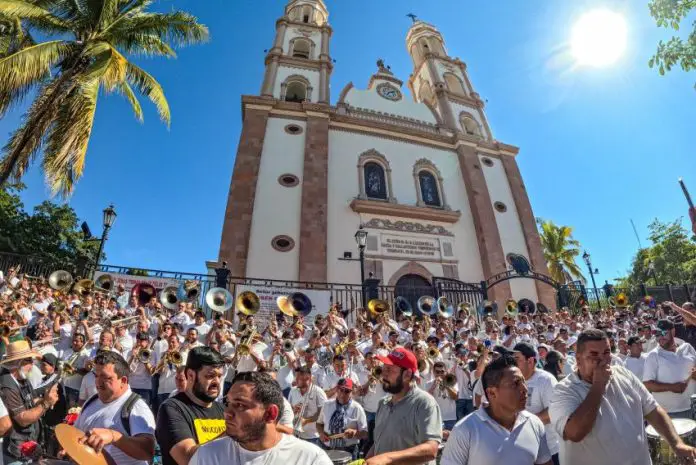Dozens of banda musicians gathered outside the Culiacán Cathedral in the capital city of Sinaloa, to play Mexican regional music and raise funds in the wake of unemployment and business closures caused by the recent wave of cartel violence.
The main event consisted of 20 music ensembles, including mariachis, playing “El Sinaloense,” a popular song in Sinaloa from the banda genre of regional Mexican music. With traditional instruments like tubas, trombones, saxophones, harmonies and drums, the banda musicians played popular songs including “El Sauce y la Palma” and “El Toro Limbo,” among others.

The event was dubbed “Jalemos con la Banda,” a play on words meaning “Let’s get together with the crew.” Besides banda music, it also featured 1.5 metric tons of aguachile, a ceviche-like dish from the coasts of Sinaloa made of raw shrimp, lime and chile.
The funds raised from selling aguachile went towards musicians, waiters, merchants and restaurant owners, who have seen their businesses affected by violence across the state. Organizers also provided grocery donations to waiters and musicians.
Banda extravaganza benefits 800 Sinaloan families
According to local media, the gathering benefited over 800 families whose income depends on the music and restaurant industries.
Event organizer and chef Miguel Taniyama donated the shrimp for the aguachile. The massive seafood dish also required 400 kilograms of cucumber, 350 kilograms of onions and 400 kilograms of lime.
“Hoy volvamos a vivir”: Miguel Taniyama y sus palabras para los culichis desde el ‘Jalemos con la banda’ pic.twitter.com/d8plS4BJ4A
— Debate (@ELDEBATE) November 21, 2024
During the event, Taniyama said that the event’s goal was to take to the streets and bring joy back to the population after 70 days of insecurity and violence in the capital of Sinaloa.
“This is the message: We are building peace. We are standing and we are all participating. This is between all of us,” Taniyama said.
Ramón Molina, representative of the mariachi sector in the state, said that the violence and time restrictions have cut off nearly all their work opportunities.
“I want to put out a call for the authorities to turn and look at us. We need to be organized,” he said.
What’s happening in Culiacán?
Since Sept. 9, an internal struggle within the Sinaloa Cartel has plunged the state and its capital city into a security crisis. Murders, confrontations between armed groups and the army, violent car thefts and kidnappings and disappearances have all spiked across the state. Culiacán has been especially hard-hit by the conflict.
The restaurant and event industries have been significantly impacted by insecurity, leading to the virtual disappearance of social events, particularly those held at night.
In early October, just a few days after taking office as president, Claudia Sheinbaum said that her security strategy for Culiacán “would work,” and that there wouldn’t be a “war against the narco,” as it happened during the 2006-2012 administration of former President Felipe Calderón.
“We will always work with the people of Sinaloa,” she said.
However, since her October comments, President Sheinbaum has mostly refrained from directly addressing the ongoing conflict.
With reports from NMAS, Animal Político and Proceso
